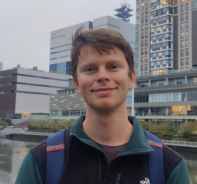Nick Latham
I was a doctoral researcher in the T2K and Hyper-Kamiokande groups at Warwick. I have now moved to a new position at King's College London.
Postgraduate research
My current research is with the T2K and Hyper-K experiments. These are two long-baseline neutrino experiments that aim to study neutrino oscillation parameters such as the neutrino CP phase , which is thought to be capable of explaining large amounts of the absent CP-violation required to explain the observed matter-antimatter asymmetry in the universe [1].
The particular focus of my research is on neutrino-nucleus interaction cross sections, which is the largest source of systematic error in neutrino oscillation studies. An improved understanding of how neutrinos interact with matter would allow for more precise determinations of the neutrino CP phase and other oscillation parameters [2]. My work is focused on charged-current pion production from electron neutrinos at the ND280 near detector, for which no cross section measurement currently exists. I also work on the development of an integrated light-injection system for the Hyper-K Cherenkov tank, which will allow for calibration of this experiment when it begins data taking.
Conferences
Poster presented at Neutrino 2022 (Seoul): 'Measurement of the Electron Neutrino Charged-Current Pion Production Cross-Section at the T2K Near Detector'.
Talk given at TAUP 2023 (Vienna): 'Recent Neutrino Cross Section Measurements with the T2K ND280 Detector'.
Talk given at NuXTact 2023 (CERN): 'Binned log-likelihood template fitting with T2K'.
Undergraduate research
I also completed an undergraduate research project in particle physics, supervised by Dr Matt Kenzie in the LHCb group at Warwick. This project involved studies for two Monte-Carlo generators in optimising measurements of the quark sector CP phase from a combined model of beauty decays and charm meson oscillations. The value of this phase is of interest because it has low theoretical uncertainty, it is accessible entirely from tree-level, and there is a ~ 2σ tension between tree- and loop-level processes [3]. Further runs at LHCb could more strongly emphasise a disagreement, which would indicate beyond Standard Model physics in another precision measurement.
Teaching
I have previously taught first year seminars for PX129/146 which supplement the core module topics, including classical mechanics, special relativity, quantum phenomena, thermodynamics and electromagnetism.
Publications
A list of publications is available at InspireHEP.
References
[1] A.D. Sakharov, Pizma Zh. Eksp. Teor. Fiz. 5 (1967) 32.
[2] K. Abe et al., Nature 580 (2020) 339–344.
[3] R. Aaij et al., JHEP 87 (2016) 03076.

